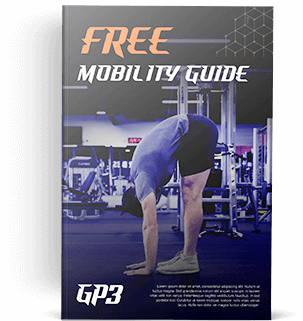Key Points:
- Sometimes, a particular person can cause disproportionate feelings of negativity within us, seemingly worse than their actions or words would warrant.
- Often, this response highlights something we don’t like within ourselves, so I’ve created a handy checklist to see if this is the case.
- The first step towards decreasing unwanted reactivity is cultivating an awareness of the parts of ourselves that we “don’t like,” and of the situations that trigger them.
Estimated reading time: 5-10 minutes
Listen to this episode on Spotify!
When I was younger, I had a very particular way of dealing with my weaker strength training exercises. I didn’t do them. Or at least, I didn’t do them nearly as frequently as the ones at which I was more proficient, which meant the “weaker exercises” tended to grow worse and worse by comparison. It’s been a clear sign of maturing in the gym that now, when I find a particular movement or exercise where my abilities are lacking, it’s kind of exciting.
I’ve grown experienced enough to know that these lagging areas tend not to need much time and attention to make significant progress, and that I’ll probably feel and move noticeably better once they’ve received some love and care. I share this because I think it makes for an excellent parallel with interpersonal situations that can be egoically triggering.
Earlier in my journey of self-exploration, I strongly resisted acknowledging my perceived shortcomings.
If a situation caused a certain amount of reactivity within me, I tended to ignore or deny it. It wasn’t until further explorations, meditations, and active work on cultivating comfort with discomfort that this started to change.
But now, my response when I find these situations looks quite similar to finding a strength or mobility weakness. “Ooh, that’s interesting. I had no idea this was here. Now that I know it exists, I can work on it.” This is not to say that discovering new areas for self-work isn’t challenging or painful. Far from it. However, having seen how powerful simple awareness of these situations, tendencies, and habits can be, I find it exciting to have something new to work on. Further, I know the efforts I make can benefit not just me, but everyone with whom I interact. This is because, to put it bluntly, after I do this work other people will have to deal with less of my shit.
So, what does this have to do with those individuals who deeply annoy us?
Well, I discovered something interesting. It seems there exists a surefire way for someone else to trigger a strong negative response within me. And, through speaking with others who also engage in this type of self-examination work, it became clear that I’m far from alone in this response.
There are a few pieces of this puzzle that combine to make others’ conduct almost viscerally repulsive. Sometimes it’s enough for one or two of these factors to be present, but if they’re all there in a single person, it practically guarantees some tension. And don’t worry, I’ll detail the list shortly.
However, I would like to clarify that what I’m about to describe does not necessarily apply to people or situations in which another individual has been genuinely unkind, cruel, or abusive towards us, a loved one, or even a stranger. I’m referring more to situations in which we seem to have an irrational-seeming level of distaste for someone else, where our dislike for them appears disproportionate to their actual or perceived offenses. With that…
What are the key factors that combine to produce extreme disdain for another person?
- They must display a trait or behavior that we see within ourselves.
- We must not like this trait or behavior about ourselves.
- We must have made an effort to consciously work on this trait or behavior.
- The other person must display this trait or behavior to a degree that we perceive as “worse” than it is within ourselves.
- The other person must appear to have no awareness that they display this trait or behavior.
- Or, they have awareness of this trait or behavior but must show or have expressed no desire to work on it.
Let’s make this concrete with an example I imagine is fairly common. Say you realize that you have a small but noticeable amount of insecurity about your career. In situations (like networking events) when this insecurity is triggered, you compensate for it by talking on and on about your professional accomplishments. Once you’ve realized you have this tendency, you’re on the lookout during situations that would trigger it. Through awareness and practice, you come to a place where you can bring up your career achievements without needing to dominate the conversation, be seen as impressive, or always bring the focus back to you. Great!
However, let’s say that despite this work you’ve done on yourself, at company happy hours, there’s a particular colleague who always and incessantly talks about themselves. And this seems to cause you a disproportionate level of distress. They really get under your skin, annoy the heck out of you, and make you dread interacting with them.
The accompanying thought storm can go something like this, though often unconsciously:
“I know I tend to talk about myself too much in certain situations, so I’m on the lookout for it. I do this so I don’t upset other people or come across as a jackass. But “Ima Loudmouth” over here talks about himself way more than I ever did! How can he not realize how bad that makes him look and how much it annoys everyone else? Damn, he sucks!”
On the conscious surface, the thoughts might sound more like, “I can’t stand that guy. He’s such a self-centered asshole.”
Thoughts like this are quite easy to fall for. They make us more likely to forget that thoughts are just reflexes, and that we don’t have to believe or act upon them. I’ve certainly made this mistake before!
One of the habits I’m on the lookout for within myself is something I jokingly call “Smartest Guy in the Room Syndrome.” It’s a desire to be perceived as intelligent and interesting, and it most commonly takes the form of dominating the conversation if it focuses on a topic about which I’m knowledgeable and passionate. It can also manifest as frequently feeling the need to offer up a “fun fact” about a subject someone else has brought up. This can easily be perceived as “one-upmanship,” and I’m certain it’s annoyed others in the past. Now, sometimes contributions like this are appropriate, and sometimes they’re not. Being aware of this habit has helped me discern when it is warranted instead of just automatically and reflexively doing it all the time.
How did I realize I had this tendency?
To start, regular meditation practice over the past three years has helped cultivate a greater sense of awareness around thoughts, bodily sensations, feelings, and emotions. With that, about a year ago, I was hanging out with a medium-sized group of friends and casual acquaintances when it became clear that two other gentlemen in this gathering also suffered from “Smartest Guy in the Room Syndrome.” And wouldn’t you know it, I had an immediate and strong aversive reaction to both of them. I could feel myself growing more and more annoyed every single time either one of them opened their mouths.
As a quick aside, it’s important to note that such a reaction can be completely independent of the perceived “reality” of a situation. In this particular case, one of the two guys in question prompted this reactivity in me because my ego couldn’t handle that he may indeed have been noticeably more knowledgeable than I was about multiple subjects I have passion for. By contrast, I thought the other guy may have had no idea what he was talking about regarding certain matters, but felt the need to contribute anyway. Regardless of the truth of either assessment, both people triggered the same reaction within me.
So, what can we do about situations like this?
Well, as cliche as this may sound, awareness is the first step. Simply acknowledging the things we don’t like about ourselves and recognizing the situations that trigger them is immensely powerful. From there, we can practice sitting with the discomfort and cognitive dissonance associated with not liking something about ourselves but simultaneously not needing to do anything about that in the moment.
Allow me to elaborate.
In the situation I described with the other two “smartest guys in the room,” there was absolutely nothing I needed to do other than acknowledge and accept how I was feeling. Calling out either of these people for their actions or contributing to the conversation with the goal of trying demonstrate my own intelligence would have been utterly inappropriate. In that particular instance, their behavior was not harming anyone in the slightest; they were simply mirroring a part of me that (at the time) I was pretty uncomfortable acknowledging existed.
The rule of thumb I like to use in instances like this one is to look at what the situation calls for. To clarify, sometimes contributing heavily to a conversation can indeed be completely appropriate. It can help inform or entertain others, but sometimes doing so serves no purpose other than to try to inflate one’s sense of self-importance. But how do we know which is which?
By practicing self-awareness, we’ll more easily notice our feelings of discomfort in the moment, and become more comfortable sitting with them before taking any actions. Afterwards, we can non-judgmentally examine the situation to see if we can discern what it was that led to these uncomfortable sensations. Developing the abilities to acknowledge uncomfortable feelings or parts of ourselves that we don’t like, to pause before acting when triggered, and to reflect without labeling or criticizing ourselves will combine to make us feel more at ease in any situation.
Then, we’ll be less likely to become egoically triggered in the first place, less likely to react impulsively when that does happen, and more likely to stay present. And, I firmly believe that when fully present, we won’t need to think about any of this. We’ll intuitively know and feel what the situation calls for, and words and actions will simply flow effortlessly. Like learning to execute a perfect squat, what once required struggle, effort, and intention will have become a strength. So, the next time we find ourselves subconsciously recoiling from someone else’s behavior, we can ask ourselves, is this because they’re demonstrating something I’m afraid lurks within me?
Before you go, I’d love to hear from you. Does the checklist I provided “check out” when it comes to other people who annoy you? If you’re comfortable sharing, what are some of the parts of your personality you’d like to work on? Reply to this email and let me know!

